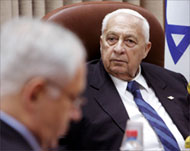Israel’s Labour quits Sharon coalition
Israel’s Labour party has voted to quit Ariel Sharon’s coalition as the prime minister considered abandoning his Likud in a move that could remake Israeli politics.

Leftist Labour’s central committee, encouraged by fiery new leader Amir Peretz, voted overwhelmingly on Sunday to leave the government it had joined to help Sharon counter rightist Likud rebels who opposed his withdrawal from the occupied Gaza Strip.
“Let the revolution begin,” said party official Eitan Cabel as he announced the result of the vote in a show of hands.
The withdrawal of the Labour party ahead of early elections was the expected first step in a week that could reshape Israeli politics, thrown into turmoil since union leader Peretz defeated veteran peacemaker Shimon Peres in a surprise leadership vote.
Resignations
Israel Radio said Labour cabinet members were likely to hand in resignation letters on Monday. They are already written.
 |
|
Prime Minister Sharon (R) will |
The big question is whether Sharon will leave Likud to form a centrist alliance that could allow him to pursue plans for ending conflict with the Palestinians without having to battle Likud opponents over giving up West Bank land.
But the gamble would be among the biggest of a military and political career of risk taking. Polls indicate Sharon, 77, would be uncertain of winning elections, expected in February or March, with a new party.
“He is liable to set in motion a political migration on a scale that the Israeli political map hasn’t witnessed since the State of Israel was founded,” wrote Shimon Shiffer in the best-selling Yedioth Ahronoth daily.
Leadership challenge
Confidants said they thought Sharon was leaning towards leaving Likud, a party he co-founded and that championed the settlement of land captured in the 1967 war, territory that Palestinians want for a state.
An announcement was possible on Monday, when Sharon was to meet Likud members of parliament, aides said.
Anticipating that Sharon would bolt and cause a leadership challenge, some Likud ministers suggested they would be ready to stand against Sharon’s old rival Benjamin Netanyahu, who resigned as finance minister to oppose the Gaza pullout.
One of Sharon’s closest allies, Justice Minister Tzipi Livni, met Likud members of parliament to discuss forming a party.
Peres absent
Adding to speculation that he was planning to break away, Sharon made comments that appeared to be aimed at wooing Peres, who was notably absent as the party voted to leave the government.
 |
|
Shimon Peres was ousted from |
A provisional election date is to be agreed upon by Wednesday ahead of a debate in parliament to set in motion the process of holding an early vote. One member of the team discussing a date acceptable to all parties said 28 March looked likely.
Peretz stands on a platform of rolling back spending cuts and free-market reforms as well as withdrawing from West Bank settlements and talking peace with the Palestinians as soon as possible.
“I intend to march Israel forward where social justice and peace will go together,” said Peretz. At the same time he vowed that “the war on terror will be without compromise”.
While ready to go further than many in Likud in giving up land, Sharon intends to keep major West Bank settlements and has ruled out talks on statehood unless Palestinians disarm resistance groups.